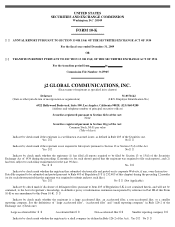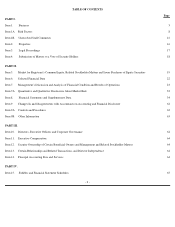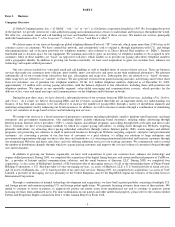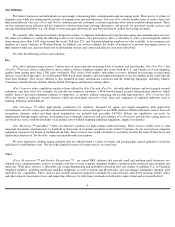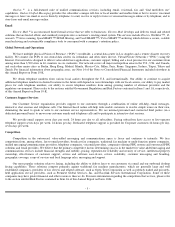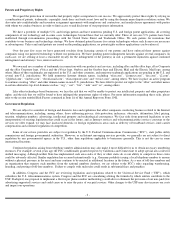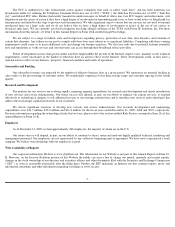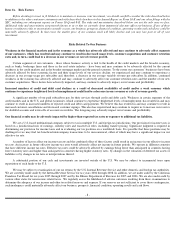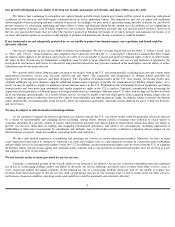eFax 2009 Annual Report Download - page 12
Download and view the complete annual report
Please find page 12 of the 2009 eFax annual report below. You can navigate through the pages in the report by either clicking on the pages listed below, or by using the keyword search tool below to find specific information within the annual report.
We believe that one of the attractions to fax versus alternatives, such as email, is that fax signatures are a generally accepted method of
executing contracts. There are on-going efforts by governmental and non-
governmental entities, many of which possess greater resources than
we do, to create a universally accepted method for electronically signing documents. Widespread adoption of so-called “digital signatures”
could
reduce demand for our fax services and, as a result, could have a material adverse effect on our business, prospects, financial condition,
operating results and cash flows.
If we experience excessive fraudulent activity or cannot meet evolving credit card company merchant standards, we could incur
substantial costs and lose the right to accept credit cards for payment and our subscriber base could decrease significantly.
A significant number of our paid subscribers authorize us to bill their credit card accounts directly for all service fees charged by us. If
people use our services using stolen credit cards, we could incur substantial third party vendor costs for which we may not be reimbursed. We
also incur losses from claims that the customer did not authorize the credit card transaction to purchase our service. If the numbers of
unauthorized credit card transactions become excessive, we could be assessed substantial fines for excess chargebacks and we could lose the
right to accept credit cards for payment. In addition, credit card companies may change the merchant standards required to utilize their services
from time to time. If we are unable to meet these new standards, we could be unable to accept credit cards. Substantial losses due to fraud or our
inability to accept credit card payments, which could cause our paid subscriber base to significantly decrease, could have a material adverse
effect on our business, prospects, financial condition, operating results and cash flows.
Our business and users may be subject to sales tax and other taxes.
The application of indirect taxes (such as sales and use tax, value added tax (“VAT”),
goods and services tax, business tax and gross
receipt tax) to e-
commerce businesses such as j2 Global and our users is a complex and evolving issue. Many of the fundamental statutes and
regulations that impose these taxes were established before the growth of the Internet and e-
commerce. In many cases, it is not clear how
existing statutes apply to the Internet or e-
commerce. In addition, some jurisdictions have implemented laws specifically addressing the Internet
or some aspect of e-
commerce and several other proposals have been made at the U.S. federal, state and local level that would impose additional
taxes on the sale of goods and services through the Internet. These proposals, if adopted, could substantially impair the growth of e-
commerce,
hamper our ability to retain and attract new customers and diminish our ability to derive financial benefit from our activities. In November 2007,
the U.S. federal government enacted legislation extending the moratorium on states and other local authorities imposing access or discriminatory
taxes on the Internet through November 2014. This moratorium does not prohibit federal, state or local authorities from collecting taxes on our
income or from collecting taxes that are due under existing tax rules. The application of existing, new or future laws could have adverse effects
on our business, prospects and operating results. There have been, and will continue to be, substantial ongoing costs associated with complying
with the various indirect tax requirements in the numerous markets in which we conduct or will conduct business.
A system failure or security breach could delay or interrupt service to our customers, harm our reputation or subject us to significant
liability.
Our operations are dependent on our ability to protect our network from interruption by damage from fire, earthquake, power loss,
telecommunications failure, unauthorized entry, computer viruses or other events beyond our control. There can be no assurance that our existing
and planned precautions of backup systems, regular data backups, security protocols and other procedures will be adequate to prevent significant
damage, system failure or data loss. Also, despite the implementation of security measures, our infrastructure may be vulnerable to computer
viruses, hackers or similar disruptive problems caused by our subscribers, employees or other Internet users who attempt to invade public and
private data networks. Currently, a significant number of our users authorize us to bill their credit or debit card accounts directly for all
transaction fees charged by us. We rely on encryption and authentication technology to effect secure transmission of confidential information,
including customer credit and debit card numbers. Advances in computer capabilities, new discoveries in the field of cryptography or other
developments may result in a compromise or breach of the technology used by us to protect transaction data. Any system failure or security
breach that causes interruptions or data loss in our operations or in the computer systems of our customers or leads to the misappropriation of our
or our customers’
confidential information could result in significant liability to us, cause considerable harm to us and our reputation and deter
current and potential customers from using our services. Any of these events could have a material adverse effect on our business, prospects,
financial condition, operating results and cash flows.
Our business is dependent on a small number of telecommunications carriers in each region and our inability to maintain agreements at
attractive rates with such carriers may negatively impact our business.
Our business substantially depends on the capacity, affordability, reliability and security of our telecommunications networks. Only a
small number of carriers in each region, and in some cases only one carrier, offer the telephone number and network services
-
10
-


